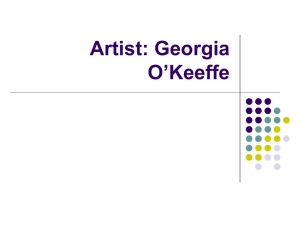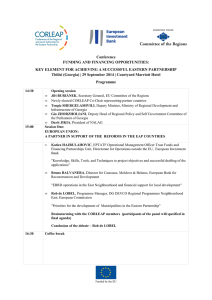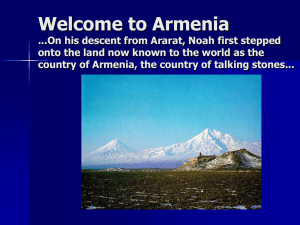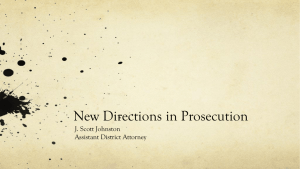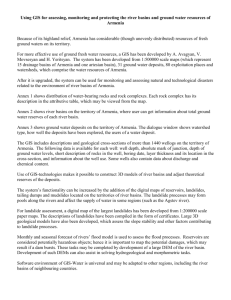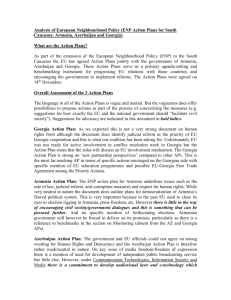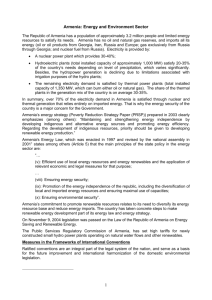pptx - GeoWel Research
advertisement
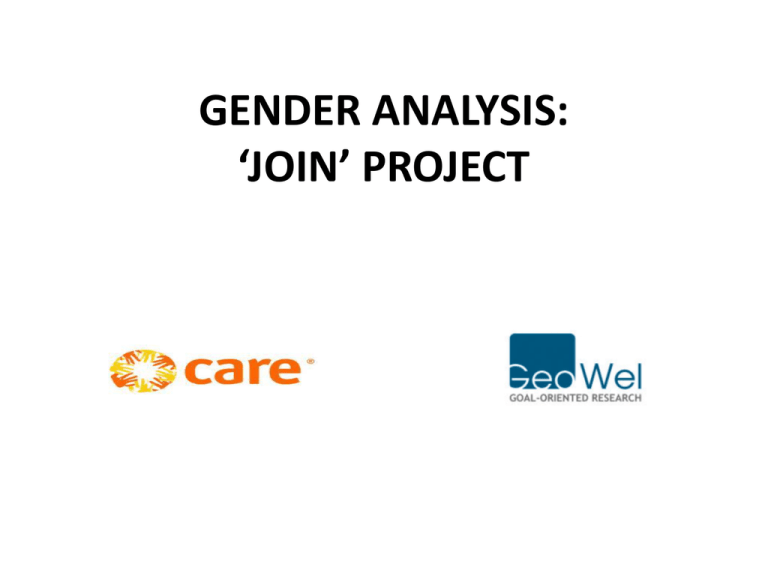
GENDER ANALYSIS: ‘JOIN’ PROJECT Project aim To identify and document the ways in which gender plays a part in the value chains of rural communities in Armenia and Georgia, so as to help inform gender-oriented programming in the JOIN Project. Methodology • Desk research of the existing reports, laws and related documents • Initial in-depth interviews with experts and practitioners • 18 focus groups in Armenia and Georgia • Mini -survey of 147 focus-group participants (non-representative) • Interviews with various value chain-actors in local communities (machinery rental, fertilizer traders, large farmers) Snapshot of the gender situation: Global Rankings Metric UN Gender Inequality Index (GII) World Economic Forum gender gap index (GGI) Social Institutions and Gender Index (SIGI) OECD Women’s economic opportunity index Georgia's rank Armenia's rank Total number of countries 73 60 187 85 92 135 60 64 86 67 57 113 Literature review • Laws in place but little enforcement • Women represented in lower-paying sectors and lower positions in a given sector • Education – boys do better than girls. But academia shows bias • Attitudes – men and women think that men should be head of household and breadwinner • Few women in political power Gender segregation of sectors Share of women employed in the sector Employment area Average monthly earnings Georgia (GEL) Georgia Armenia 1022 Construction Transport/communica tion 7% 2% 974 8% 17% N/A Energy 19% 17% 735 Manufacturing 27% 34% 662 Real Estate Education, Healthcare/social assistance 38% 28% Education – 416 83% 82% Health and social work- 582 Female participation in ownership and workforce across sector Armenia Georgia 43% 41% 37% 32% 20% 13% % of firms with female % of firms with a female top % of permanent full-time participation in ownership manager workers that are female Who should be the family decisionmaker in the family? Armenia Georgia 75% 63% 35% 20% 4% Man 1% Woman Equally Who should be breadwinner in the family? Armenia 85% Georgia 83% 14% 1% Man 14% 2% Woman Equally Patterns of Rural Trade Markets for agricultural goods DK 2% Other 6% To a wholesaler 16% Local market 17% Directly to local customers 59% • Reasons for selling locally – For example, potatoes cost 38 tetri at the market, while in my village I sell them for 30 tetri … 8 tetri will not be enough to hire a truck and take potatoes to the market (Female, Ninotsminda) – If, for example, I have to buy furniture or a refrigerator, then it will make sense for my family to take potatoes to Tbilisi and try to sell there … it’s not worth the effort to travel such a long distance simply to sell potatoes (Female, Akhalkalaki) • Trade often takes a form of bartering – men talk to the people who come to our house about the sale… often they can’t negotiate properly and are too obstinate… in such cases we tell them, quietly, to lower the price and sell (Female, Azeri, Marneuli) Loans and credits • Accessibility to credits has increased • Preference for Consumer loans over agricultural loans – Cheaper – Less risky (as don’t rely on harvest) Division of roles between men and women • Generally women responsible for more than men • Women – Day-to-day horticulture , weeding and harvesting – Milking – Food processing (like cheese) • Men – Dealing with people outside the household – Technical work and driving – Manual labour requiring brute strength • “Unsuitability” of women for certain jobs – We have two women employed here at the office... it would be hard for a woman to work like us – we have to travel to villages often and meet local population there... in our business, women are more suitable for office work (potato seeds reseller) • Need for qualified people – there is a huge problem of qualified tractor drivers ... if anybody learns some skills, then they prefer to buy their own tractor rather than working on somebody else ... I remember, in Soviet times, there were some women tractor drivers as well... don’t know what and why exactly it happened, but there are no women tractor drivers any more ... if there were qualified women, then I would gladly employ them... the society wouldn’t have problem of accepting such cases either, as everybody remembers that we had women drivers back in the past (Owner of a machinery rental service) Irritation at unfairness – If we [women] can lift heavy buckets, then why men can’t help us in our performing our tasks (Female, Ninotsminda) – We are not women anymore… we work so much on the land that there is no time to feel like a woman… to look after ourselves and look better (Female, Ninotsminda) Gender and decision-making Decision-maker in the family Armenia 46% Georgia 47% 35% 24% 19% 11% 9% 6% 2% Wife Husband Equally Someone else in the household 0% DK Man as formal head • “Head of family” and decision-making on every-day issues – Of course, man is a head of a family, but woman is a neck… so she can turn the head to whichever direction she pleases • The burden of responsibility – The woman does not want to be responsible. If something does not work out, she will be blamed for it. It’s better for the man to decide (Ninotsminda, female) – If I decide, then I will be responsible for doing all the work. The decision should be made together, so we both equally work (Ninotsminda, female) – Decisions on spending money should be discussed in the family, so the if something goes wrong it is not just one person’s fault (Amasia, male) • Woman as a “bank” – when my husband earns money, he brings all the money to me to store… then, when money is needed for a particular thing, I give it to him (Female, Akhalkalaki) • Unreliability of men – He [a husband] is very kind… so if he has money, he has to distribute to anybody who asks for it… so, how can I trust money to him? I’m the one in family who keeps money and control its efficient use • Sense of responsibility – My husband doesn’t want to breed cattle, but I have a sense of pride. Our children need to drink milk, why should I pay to buy the milk from someone else? (Azatan, female) – If it was left to my dad, we would rather sell all the cattle. If my mom and I weren’t telling him, we wouldn’t have anything. Women always want to have more” (Amasia, female) – “If it was up to our men we wouldn’t be doing anything” (Ninotsminda, female) • Potential for “Authoritarian rule” by men – There is an authoritarian rule at home from my father … From early ages, I was very interested in trying things, like cross-breeding different plants… but whatever I did, my father and brothers disregarded, even if I suggested something practical as opposed to do nothing… They are not interested in my initiatives. They take as embarrassment if I do some technical stuff. I do have skills but they don’t appreciate my efforts (Female, Georgian, Marneuli) Houses registered on females yes no DK 76% 76% 24% 22% 3% 0% Armenia Georgia Access to information • Need for new type of knowledge – We know basic, traditional agricultural rules, but it is not enough for effective farming… during the Soviet Union, we used to have specially designated laboratories which would tell us the chemical composition and fertility of our lands and seeds… then agronomists would tell us what to grow, where, hot to look after them, and what to expect… such help would be very useful (Female, Ninotsminda) • Knowledge of markets Enough information about farming practices? Yes Georgia Armenia 44% 41% No DK 51% 5% 56% 3% What skills needed Armenia Georgia 54% 46% 42% 31% 14% 9% 4% 0% Information/Instruction about fertilizers Marketing/Realization Skills Skills/knowledge for new technologies Skills/knowledge for processing Knowledge of language Fluent Conversational Basic 10% 3% 29% 58% Don't speak Political and civic participation • Women for façade – There are a couple of women deputies in Marneuli sakrebulo, but they don’t do anything… it’s just for statistics, not for representing our voices (Azeri female, Marneuli) • The case of “almost appointed” Azeri female village trustee – After everything was agreed and we knew that she was going to be our village trustee, the Gamgebeli said that he couldn’t do it and appointed a man from a different village… he said that men in our villages wouldn’t accept a woman in charge (Azeri female, Marneuli) • Women prefer women in power to talk to – For me, as a woman, it is easier to communicate with a woman… it would be easier to explain my problem and I would be less shy (Azeri female, Marneuli) • But little support from family members for active women – I was working for two different NGO projects. To keep up, I had to wake up at 6:30 in the morning, milk cows, take them to pasture … Then I would come back and make cheese, prepare and dress myself, and go to work, which would take up to about an hour by bus … in rainy days I was particularly worries as calves might have gotten in trouble … before going to sleep, I had to milk cows again at around 1 a.m (Georgian female, Marneuli) Program issues to consider • Women are a good focus for agricultural development work • Women may have practical control but need to defer to husbands • Efforts to contact/access women need to be close to household • Could be difficult to move into technical areas with women • Considerable demand by women for further information and training • The people in our focus groups were extremely economically rational and should respond well to good economic arguments Questions/comments

